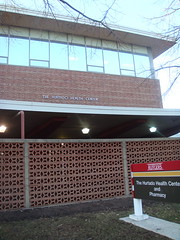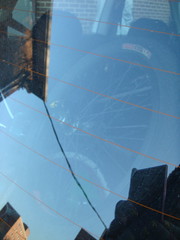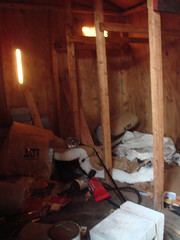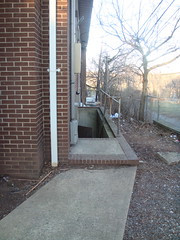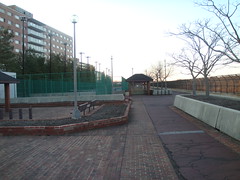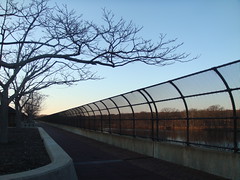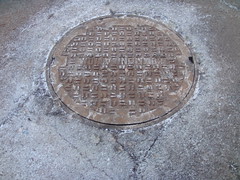audio
Monday, May 4, 2009
Manifesto
Gabriella Potievsky
Neighborhood Narratives
May 29, 2009
Manifesto
We are trying to open up the eyes of everyone to art. To see things differently and to see them as others view the same art piece. Art is not what you see and what you think. It is what it makes you want to vocalize and what it happens you want to do with your body. By looking at the way museums are structured. There are multiple flaws within museums, itself. Museums serve to control our views of the past. They do this by failing to account historical argument without providing alternative or both viewpoints of the time period. In addition, by presenting the past in terms of a coherent, linear, unified narrative. As well, by creating complex audio, visual and textual experiences, in which the observer is overwhelmingly confronted by the massive weight of all the physical evidence and after being penetrated in such an intimate way by a holistic bodily experience, observers are then typically directed to gift shops, where they are likely encouraged to purchase books which can help to further reinforce the desired propaganda of the museum's particular ideology. Lastly, they present a view of history based entirely upon the romanticization of the achievements of great men, brilliant thinkers, cultural or scientific innovators, war heroes and their technologies. The real questions are what interpretive strategies art museum visitors deploy? What are the implications for communication policies within art museums? To survive, the visitor must establish a “no-place” that is located in the present time. For visitors to use the what we have done in the museum to create a new way of seeing and occupying the world. To let it shape their lives in society, transform the cities, and shift their perception along with the ground beneath our feet. Every project has a voice or bias. To connect everyone by separating him or her, for the fact that one cannot connect without separating. To take in space because we live in space, and not just the space that we are use to seeing taken up by object, but the space that we can move around in and express the way we see the art. We intend to break the laws that prevent the development of meaningful activities in life and culture. The setting of a stage to extend dialogue between body, building, art and the space we are in. to break free from the ‘proper’ rules in the place.
Neighborhood Narratives
May 29, 2009
Manifesto
We are trying to open up the eyes of everyone to art. To see things differently and to see them as others view the same art piece. Art is not what you see and what you think. It is what it makes you want to vocalize and what it happens you want to do with your body. By looking at the way museums are structured. There are multiple flaws within museums, itself. Museums serve to control our views of the past. They do this by failing to account historical argument without providing alternative or both viewpoints of the time period. In addition, by presenting the past in terms of a coherent, linear, unified narrative. As well, by creating complex audio, visual and textual experiences, in which the observer is overwhelmingly confronted by the massive weight of all the physical evidence and after being penetrated in such an intimate way by a holistic bodily experience, observers are then typically directed to gift shops, where they are likely encouraged to purchase books which can help to further reinforce the desired propaganda of the museum's particular ideology. Lastly, they present a view of history based entirely upon the romanticization of the achievements of great men, brilliant thinkers, cultural or scientific innovators, war heroes and their technologies. The real questions are what interpretive strategies art museum visitors deploy? What are the implications for communication policies within art museums? To survive, the visitor must establish a “no-place” that is located in the present time. For visitors to use the what we have done in the museum to create a new way of seeing and occupying the world. To let it shape their lives in society, transform the cities, and shift their perception along with the ground beneath our feet. Every project has a voice or bias. To connect everyone by separating him or her, for the fact that one cannot connect without separating. To take in space because we live in space, and not just the space that we are use to seeing taken up by object, but the space that we can move around in and express the way we see the art. We intend to break the laws that prevent the development of meaningful activities in life and culture. The setting of a stage to extend dialogue between body, building, art and the space we are in. to break free from the ‘proper’ rules in the place.
Sunday, May 3, 2009
Tuesday, March 10, 2009
google maps
I've shared a map :
You can view and edit this map at
http://maps.google.com/maps/ms?hl=en&ie=UTF8&oe=UTF8&msa=0&msid=106467432341610257061.000464a6e8a67ae0a7334
You can view and edit this map at
http://maps.google.com/maps/ms?hl=en&ie=UTF8&oe=UTF8&msa=0&msid=106467432341610257061.000464a6e8a67ae0a7334
Tuesday, February 17, 2009
Tuesday, February 10, 2009
QUESTIONS ON THE READING
ME++, THE CYBORG SELF AND THE NETWORKED CITY:
1. What does William Mitchell mean when he says framework?
2. What are the logic gates?
3. What does the sentence mean: "I am becoming the focal point of a global personal Panopticon." (page 7)
4. What are the ports of entry and exit?
5. Does he like the cyber world?
SPACE AND PLACE:
1.Why is there no space for another building in the lot?
2. What is wrong with studying animals?
3. What does his graph of visual perception and indirect mode of symbolization actually mean? (page 8).
4.What is the significance of looking at Eskimos? We all have different experience and what we take back, but why Eskimos?
5. How does society have a stron impact on the development of spatial skills?
OF OTHER SPACES:
1. How can heterotopias be described?
2. What meaning do they have?
3. Why are Utopias sites with no real place?
4. Why is the cemetery is certainly a place unlike ordinary cultural spaces?
5. Why aren't the heterotopic site not freely accessible like a public place?
1. What does William Mitchell mean when he says framework?
2. What are the logic gates?
3. What does the sentence mean: "I am becoming the focal point of a global personal Panopticon." (page 7)
4. What are the ports of entry and exit?
5. Does he like the cyber world?
SPACE AND PLACE:
1.Why is there no space for another building in the lot?
2. What is wrong with studying animals?
3. What does his graph of visual perception and indirect mode of symbolization actually mean? (page 8).
4.What is the significance of looking at Eskimos? We all have different experience and what we take back, but why Eskimos?
5. How does society have a stron impact on the development of spatial skills?
OF OTHER SPACES:
1. How can heterotopias be described?
2. What meaning do they have?
3. Why are Utopias sites with no real place?
4. Why is the cemetery is certainly a place unlike ordinary cultural spaces?
5. Why aren't the heterotopic site not freely accessible like a public place?
Wednesday, January 21, 2009
This is what I carry with me

I'm always on the run, I can't be bothered with stuff. Whenever you see me, I'll most likely being on my way to somewhere. I don't like sitting, I need to be doing something. Also I love making new friends and if I have a huge bag full of things, then I constantly have to worry about the bag, make sure if I have it, where to put it, can I go on an adventure or is my bag going to get in my way. I like to let destiny takes it coarse and hope that everything I have on my will keep me going. Plus with a bag, it takes too much attention away from your environment. Instead of talking to the people around you, people tend to text none stop or instead of taking in their surrounds, they are too busy finding the next song they want to listen to. This winter break I went to Israel on birthright. We had a packed schedule, we did 21 things in 10 days and having a bag to carry around all the time that is loaded with stuff wouldn't work out for me. I was able to grasp my surrounds and enjoy my time with just my jacket and my camera in my pocket. After Israel I went to Mexico and having a bag on you is pointless because you are at a resort and anything you need, the workers will get for you. Lastly, the reason I don't carry much is because I really don't need much, just my camera and good company and the good times come rolling out.
Subscribe to:
Posts (Atom)














